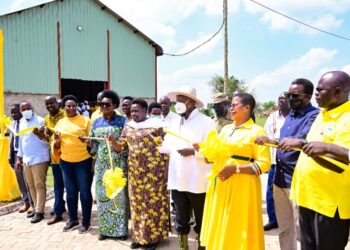The Director of the Makerere Institute of Social Research, Prof. Mahmood Mamdani has cautioned the Ministry of Lands to ‘go slow’ on the Compulsory Land Acquisition Bill.
Mamdani said the law is not clear on people who may buy land after getting information that the government is interested in it.
When the Land Amendment Bill 2017 was tabled in Parliament, it fuelled controversy with most members against it. They feared that if it becomes a law, Ugandans will no longer have rights on their land yet over 80 per cent of Uganda’s population thrives on land as substance farmers.
Because of the many loopholes, last year Prime Minister Ruhakana Rugunda advised Parliament to send it back for consultations.
“We are the sponsors of this Constitution Amendment Bill. However, subsequent to presenting it for the first reading, the government discovered that the Bill required extensive consultations. For the reasons I have given, I beg to say that this Bill is withdrawn pending further consultations,” Rugunda said during plenary on September 4, 2018.
In a bid to fill the pending gaps, Ministry of lands, Housing and Urban Development held a national dialogue this week in Kampala, where all the stakeholders gave out their views.
Prof. Mamdani who was the keynote speaker said all land complexes in Uganda are attributed to the 1900 agreement that left all land matters in an imbalanced state
He said the main problem in the law is the condition of compensation where most people buy the land after anticipating that the government is planning to use a certain land.
“We have many examples of compensation kind, land for land in Austria, home for a home in Canada and India, there must sufficient arrangement for this to work out clearly,” said Mamdani
Mamdani said the compulsory statement in the law already created fear in Ugandan which the ministry must deal with.
His argument was supported by Executive Director Global rights Alert, Winnie Ngabirwe who said government on several occasions has taken land that has been benefiting the entire community to one individual who puts his own business that doesn’t help the community.
“There is still a big gap between the landowners and the government on compensation values for different lands which the bill does not answer,” said Ngabirwe.
However, Director Land Management for the Ministry of Lands Richard Oput said that project affected persons will be paid before their land is taken.
“The law also gives rights to the owners on whether to be paid in cash or land to land policy,” said Oput.
Do you have a story in your community or an opinion to share with us: Email us at editorial@watchdoguganda.com











